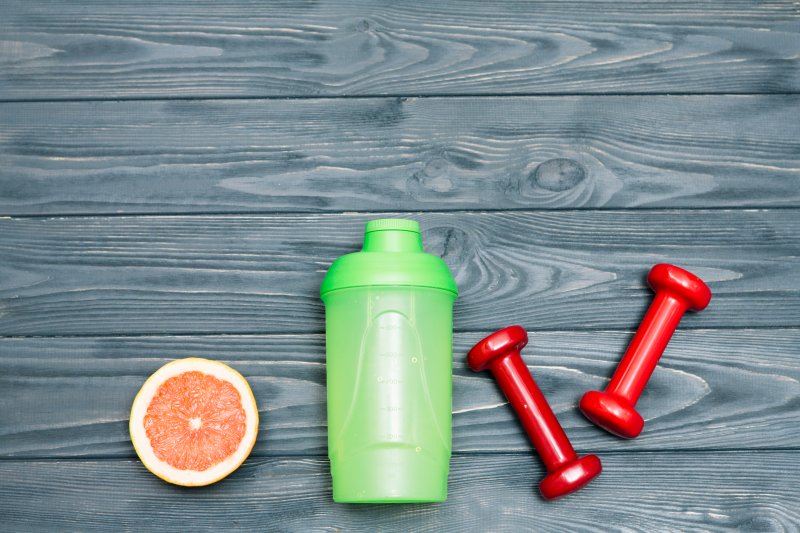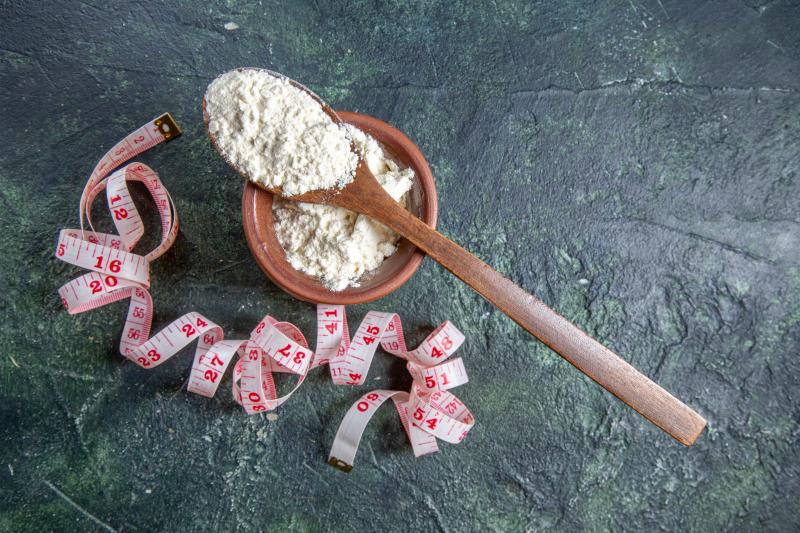Key Takeaways
- Whey protein is a popular fitness supplement. It is not just for bodybuilders and is not harmful to your kidneys.
- It does not cause weight gain, is not a steroid, and you need not consume it immediately after a workout.
- When choosing quality protein sources, consider how well the body absorbs them and whether they provide vitamins and minerals.
Whey is a byproduct of manufactured cheese. It is the liquid content remaining after milk has been curdled. While the solid part goes for manufacturing cheese or tofu, the remaining protein-rich liquid part is called whey. Whey protein has become a highly sought-after supplement among fitness enthusiasts.
What you need to know:
- Myth 1: Protein is only for bodybuilders
- Myth 2: Too much protein is harmful to your kidneys
- Myth 3: Protein makes you gain weight
- Myth 4: All protein sources are the same
- Myth 5: Whey protein is a steroid
- Myth 6: You need to consume protein immediately after a workout
- Prioritize quality protein sources
However, there are several misconceptions surrounding it. Let us debunk some common myths about protein powder and understand its benefits.
Myth 1: Protein is only for bodybuilders

One common misconception is that whey protein is solely intended for bodybuilders and weightlifters. While it is true that athletes in these disciplines often rely on whey protein, its benefits extend far beyond muscle building. It can benefit individuals pursuing various fitness goals, including weight loss, general fitness, and recovery from illness or injury. It is a complete protein that contains all the essential amino acids needed for optimal body functioning. These amino acids support muscle repair and growth, boost the immune system, and produce enzymes and hormones. Additionally, it can help regulate appetite, promote satiety, and enhance fat loss while preserving lean muscle mass. Its versatility makes it suitable for anyone looking to improve their health and well-being.
Myth 2: Too much protein is harmful to your kidneys
This is one of the most commonly widespread myths surrounding protein powder consumption. Consumption of excessive protein may pose a risk to individuals with pre-existing kidney conditions. Numerous studies suggest that moderate protein powder consumption within recommended guidelines is safe for human health.
Myth 3: Protein makes you gain weight

Another myth circulating protein powders is that they are only suitable for those looking to gain weight or bulk up. While protein is crucial for muscle growth and repair, it also plays a vital role in weight management and fat loss. Consuming protein powder as a part of a balanced diet and exercise regimen can help preserve lean muscle mass while promoting fat loss.
Myth 4: All protein sources are the same
No, not all protein sources are the same. Plenty of options are available on the market, each with unique properties and benefits. Whey protein, for instance, is one of the most popular options due to its rapid absorption and high levels of essential amino acids. However, alternatives, such as casein, soy, and pea protein, cater to different dietary preferences and requirements.
Myth 5: Whey protein is a steroid
Whey protein is not a steroid. Steroids are man-made hormones that are used to enhance athletic performance. They can cause abnormal tissue and cell growth and can have side effects like weight gain, hypertension, and cancer. It is a protein supplement derived from milk that is safe to consume. The association may come from the fact that protein powders are often associated with bodybuilding. However, protein powders are not steroids.
Myth 6: You need to consume protein immediately after a workout
You need not consume protein immediately after a workout to build muscle. The timing of protein consumption is not as important as the amount consumed throughout the day. The anabolic window is the time after a workout when your muscles are repairing and recovering. However, the length of the anabolic window depends on your protein intake throughout the day. Consuming protein during the anabolic window can help optimize muscle growth. Also, recovery depends on many factors, including age, hormones, diet, and training routine. You can drink a protein shake shortly before or after your workout or change the timing based on your meals or daily schedule.
Prioritize quality protein sources
When choosing quality protein sources, you can consider the following:
- Whether the protein contains all the nine essential amino acids, like threonine, tryptophan, and valine.
- How well the body absorbs and uses the protein.
- Whether the protein also provides other nutrients like vitamins and minerals.
- Whether the protein comes from animal or plant sources.
Some examples of high-quality protein sources include eggs, dairy, cheese, Greek yogurt, edamame, tofu, fish, and quinoa.
Do not get carried away by the common misconceptions surrounding protein; instead, include quality protein sources in your diet for overall health.
Stay tuned to the Activ Living Community. Keep up to date with the latest health tips and trends through expert videos, podcasts, articles, and much more on nutrition, fitness, mindfulness, and lifestyle conditions like Asthma, Blood Pressure, Cholesterol, and Diabetes. Activ Living ke saath sahi sehat ki shuruat ABHI karo.
You may also be interested in the following blogs:
- Are You At Risk Of Protein Deficiency? 6 Critical Signs To Watch Out For
- Healthy Fats, Fiber And Protein For Diabetes Management: All You Need To Know
Popular Searches
How to lower blood pressure | Fruits good for liver | Unhealthy foods | Ragi Benefits | Basal Metabolic Rate | Acupressure points for High Blood Pressure | Ayurvedic medicine for blood pressure | How to control cholesterol at home | Homeopathy for Asthma | Biological Age | Home remedies for TB | Natural beta blockers | Negative effects of internet | Types of walking | Blood pressure calculator | Blood sugar calculator | BMI Calculator





 1800-270-7000
1800-270-7000






